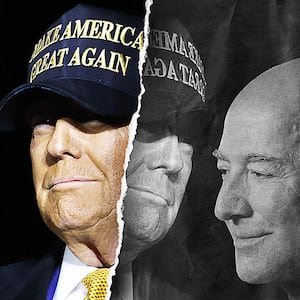Washington Post publisher Will Lewis downplayed the suggestion that owner Jeff Bezos made the newspaper editorial section end endorsements in presidential elections as a favor to Donald Trump.
Robert Kagan, who resigned as Post columnist and editor and large over Bezos’ decision Friday, told The Daily Beast he believed Bezos’ decision amounted to a “quid pro quo” with the former president.
He noted that executives from Bezos’ Blue Origin space company met with Trump in Texas on the same day the paper was stopped from issuing an endorsement of Trump’s Democratic opponent, Kamala Harris.
“Trump waited to make sure that Bezos did what he said he was going to do, and then met with the Blue Origin people,” Kagan said. “Which tells us that there was an actual deal made, meaning that Bezos communicated, or through his people, communicated directly with Trump, and they set up this quid pro quo.”
CNN reported that Trump also spoke recently to Andy Jassy, CEO of Amazon, which Bezos co-founded and now serves as executive chairman. Both Blue Origin and Amazon compete for massive federal government contracts that Trump would have influence over if he were elected president.
Blue Origin CEO David Limp told The Wall Street Journal on Sunday that the meeting lasted only a few minutes and that he and Trump shook hands and “exchanged pleasantries about space.”
Lewis appeared to dismiss Kagan’s claim in a Sunday evening statement issued to multiple outlets.
“The decision to end presidential endorsements was made entirely internally and neither campaign nor candidate was given a heads up or consulted in any way at any level,” he said. “Any reporting to the contrary is simply incorrect.”
Senior newsroom leaders at the Post flew to Miami in late September to meet with Bezos, who expressed his reservations about election endorsements to Lewis and opinion page editor David Shipley, The New York Times reported.
When Bezos made his final decision weeks later, Lewis was given the task of offering up an explanation to the Post’s readership, claiming it was a return to the newspaper’s “roots.” Before 1976, the paper generally stayed clear of making presidential endorsements.
After Lewis’ justification went live on the Post’s website Friday, angry readers and commentators savaged the decision on social media, while many in the Post’s newsroom were left baffled and disheartened.
Kagan resigned that day, while a second opinion page contributor, former NPR anchor Michele Norris, resigned Sunday. Eighteen Post columnists put their names to a protest column that pilloried management for making “a terrible mistake.”
Among those who said on social media that they had canceled their Post subscriptions were actors Jeffrey Wright, a native of Washington, D.C., and Bradley Whitford, star of The West Wing.
“Hometown paper. Grew up with it. Bye, byatch,” tweeted Wright.
Bestselling author Stephen King and former Rep. Liz Cheney (R-WY) also said they had canceled their subscriptions.
They were hardly alone: According to a source who spoke to The Wall Street Journal, thousands of people have canceled their Post subscriptions in recent days.
The Post, reporting on its own newsroom, said some journalists undertook the grim task of looking at the web traffic for the customer page where people can cancel subscriptions. They say that the number of visitors was “soaring,” the paper said.






